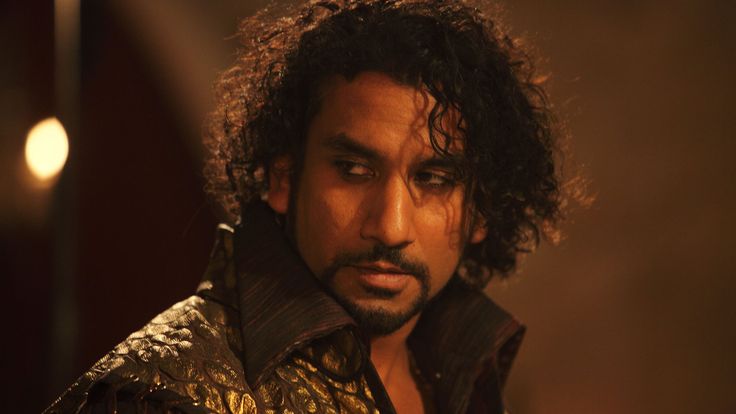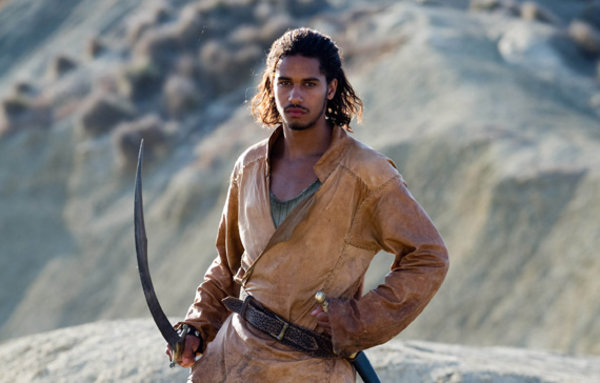Big Worlds On Small Screens: Rebecca Fisher Discusses “Sinbad”
~ by Rebecca Fisher
Introduction:
After the success of Robin Hood (2006 – 2009) and Merlin (2008 – 2012) over on the BBC, it must have seemed a fair bet for Channel Sky1 to try and fill the Saturday night slot by broadcasting their own take on a famous fantasy hero: Sinbad. Unfortunately it didn’t do as well as its predecessors, lasting only a single season and never picking up much of a following.
So why do an article on the subject? I have an underlying fascination with shows that never quite get off the ground (Roar back in the 1990s was another one) and in examining how exactly things went wrong. Sinbad appeared to have all the prerequisites for a popular show: a strong cast, a solid premise, reasonably high production values – but it lacked the all-important “x-factor” that garners a wide audience.
Premise:
Unlike the likes of Robin Hood or King Arthur, Sinbad is a fairly nebulous character to adapt. The oldest tales involving him (dating back to the 17th century) are composed of sea voyages filled with strange creatures and mysterious islands, but this version eschews all that in favour of original storylines.
After a series of bad decisions culminates in his brother’s death, Sinbad is cursed by his own grandmother to remain at sea, with a twenty-four hour time limit put on his forays inland thanks to a necklace that will strangle him to death if he doesn’t return to his ship before the sun rises each morning.
 Sinbad and the cursed necklace
Sinbad and the cursed necklace
Sinbad is forced to leave his home and join up with a motley gang of misfits (the mercenary, the princess, the physician, the pickpocket, the bounty hunter, the cook) who are thrown into a range of familiar fantasy plots each week.
Story:
The show runs on a fairly formulaic series of plots: there’s the evil siren that magically entrances our hero, the heist episode in which they have to negotiate traps and snares to retrieve the treasure, the one in which everyone’s deepest dreams appear to come true, and the inevitable descent into the Underworld and back. There’s lots of getting thrown into prison, plenty of sword fights, and repeated reminders that our lead character is irresistible to women.
 Naveen Andrews as Lord Akbari. You can tell he’s evil because of the eyeliner.
Naveen Andrews as Lord Akbari. You can tell he’s evil because of the eyeliner.
It’s entertaining enough, but the show’s greatest weakness is its want of a decent villain. Lord Akbari (Naveen Andrews) becomes obsessed with revenge after his son accidentally dies at Sinbad’s hands, but the lack of a personal history between the two characters means there’s no real meat to their animosity. His court sorceress Taryn (Orla Brady) fares a little better as an actual threat to our protagonists, but towards the end she becomes something of an unlikely ally – again robbing the show of any sense of urgency.
One can’t help but feel that some of the show’s cheesier elements (such as the anachronistic speech patterns, the dodgy television special effects, and the perpetually shirtless lead) would be more excusable if they were part of a more interesting story.
Characters:
The main cast is largely made up of newcomers: perhaps Elliot Cowan as an exiled Viking is the most familiar actor, but the likes of Marama Corlett (Rina), Dimitri Leonidas (Anwar), Estella Daniels (Nala) and Elliot Knight (Sinbad himself) are still relative unknowns – though the show has to be given credit for assembling a racially diverse cast for a story that takes place across the Middle East.
 From left: Cook, Rina, Anwar, Sinbad, Gunnar, Tiger and Nala
From left: Cook, Rina, Anwar, Sinbad, Gunnar, Tiger and Nala
The problem is that each one is a fairly stock character, and though they’re developed individually as the show goes on, they never quite become a cohesive unit, and completely lack the fascinating dynamics of (for example) the crew of Firefly, or the golden trio of Harry Potter, or the assorted members of the X Men.
But every now and then a surprising face will pop up: somehow the show’s runners managed to book the likes of Dougray Scott (Father La Stessa), Evanna Lynch (Princess Alehna), Sophie Okonedo (Razia), and Timothy Spall (Anicetus.)
Conclusion:
So that was Sinbad: over almost as soon as it had begun, and without leaving much of a ripple on the world’s collective consciousness. Most people have probably forgotten it entirely – if they ever knew about it at all.
What we’re left with is a confusing and patchy single season that isn’t sure what story it wants to tell. Akbari’s vendetta, the curse set upon Sinbad, and the budding romance between him and Nala are all abruptly brought to a close by the middle of the season, and the show’s second half meanders through a range of seemingly meaningless one-shot adventures before a finale that sets things up for the non-existent second season.
Still it’s a shame that it was cancelled so soon – worse shows have been given a second chance and managed to straighten themselves out, and there were some interesting narrative seeds sown that could have had pay-off later on. Instead we’re left with this odd little curiosity: the short-changed voyage of Sinbad.
.
Next Time: Farscape
We go from an obscure failure to a cult classic: it ran for a grand total of four seasons and a concluding miniseries, it starred a number of imaginative creations from the Jim Henson Creature Shop, and it’s still remembered fondly to this day. It’s Farscape of course, and I’ve got two weeks to cram in as many episodes as possible.
.
About The Reviewer:
 Rebecca Fisher is a graduate of the University of Canterbury with a Masters degree in English Literature, mainly, she claims, because she was able to get away with writing her thesis on C.S. Lewis and Philip Pullman. She is a reviewer for FantasyLiterature.com, a large website that specializes in fantasy and science-fiction novels, as well as posting reviews to Amazon.com and her They’re All Fictional blog.
Rebecca Fisher is a graduate of the University of Canterbury with a Masters degree in English Literature, mainly, she claims, because she was able to get away with writing her thesis on C.S. Lewis and Philip Pullman. She is a reviewer for FantasyLiterature.com, a large website that specializes in fantasy and science-fiction novels, as well as posting reviews to Amazon.com and her They’re All Fictional blog.
To read Rebecca’s detailed introduction of both herself and the series, as well as preceding reviews, click on:
Big Worlds On Small Screens
Rebecca has recently won the Sir Julius Vogel Award 2015 for Best Fan Writer, for writing including Big Worlds On Small Screens.









